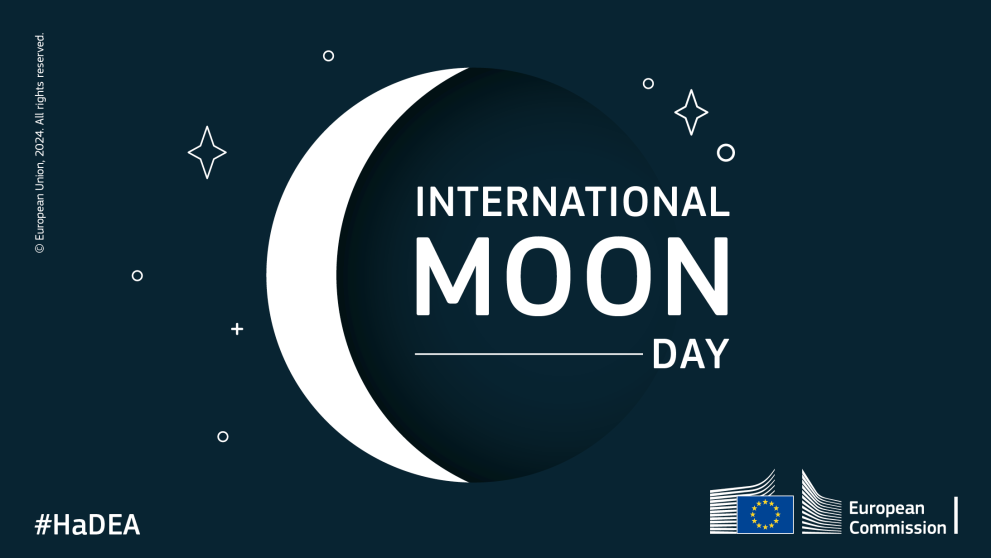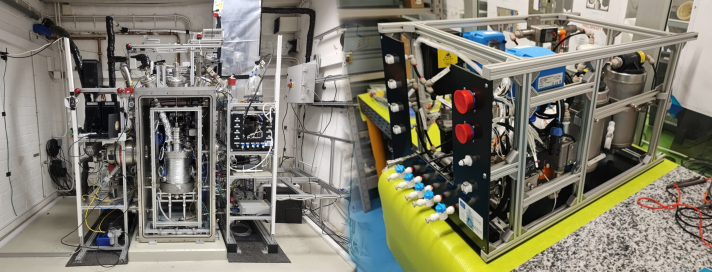
International Moon Day is celebrated annually on 20 July, marking the anniversary of the first landing of humans on the Moon. The day is a global celebration that serves not only as a reminder of past achievements, but also as an annual testimony to future Moon endeavours. Moreover, it aims to raise public awareness about sustainable Moon exploration and utilisation.
Funded by Horizon Europe, EU Space Research projects are developing breakthrough technologies and innovative scientific instruments to advance future Moon exploration. The EU-funded project LUWEX, short for ‘Validation of Lunar Water Extraction and Purification Technologies for In-Situ Propellant and Consumables Production’, is one of these pioneering projects.
Dr. Paul Zabel is Project Lead at the German Aerospace Center (DLR) Institute of Space Systems, and is coordinating the interdisciplinary LUWEX team with partners from Austria (LIQUIFER Systems Group), Germany (TU Braunschweig), Italy (Thales Alenia Space) and Poland (Scanway and Wroclaw University for Science and Technology).
What are the main objectives of the LUWEX project?
LUWEX aims at developing and validating lunar water extraction and purification technologies in order to utilise in the future ice that is present on the lunar surface for the production of propellant and potable water for astronauts. The project team develops individual technologies which are then tested in a laboratory environment.
The novel idea behind LUWEX is that we not only test individual systems, but that we combine them in a complete process chain. By doing so, we can get additional experience and knowledge in operation and interaction between systems.
The project started in November 2022 and is nearing its completion in October of this year. Which achievement are you most proud of so far?
We built a complete lunar water extraction and purification process chain in a laboratory setup. The experiment looks really impressive, because it not only involves the LUWEX systems, but also a large thermal-vacuum chamber to simulate the lunar environment. Together the LUWEX systems and the thermal-vacuum chamber form a very complex technical system. We have been able to build this system and make it work so that we can perform experiments.
Until the end of the project we want to produce a few litres of purified water from a lunar icy-regolith simulant mixture.
The harsh lunar environment poses many challenges. Which was one of the main technical challenges you had to overcome?
The lunar environment is indeed very challenging. The main technical challenge for LUWEX was the combination of dust and ice particles in a single sample mixture. The ice itself is very tricky to handle in a laboratory setup, because it needs to stay cooled to lunar temperatures all the time, which involves a lot of cooling with liquid nitrogen. The regolith poses a problem because it contains particles of less than 1 micrometres. This dust is easily stirred up and then settles everywhere, when not handled carefully and so contaminates surfaces and sealings. Using an icy-regolith sample combines both issues and required a lot of effort for handling during the experiments and also caused a few technical problems with our experiment hardware.
"We built a complete lunar water extraction and purification process chain in a laboratory setup. The experiment looks really impressive because it not only involves the LUWEX systems, but also a large thermal-vacuum chamber to simulate the lunar environment."
Dr. Paul Zabel, Project Coordinator - German Aerospace Center (DLR)
In which ways have you been communicating about the project?
We use the typical standard formats for communicating our project, meaning a website, a LinkedIn page, press releases, talks at conferences and exhibitions. But we also went beyond that and produced seven podcast episodes with the title “Water Beyond Earth”, which are freely available! The podcast features not only members of the project as speakers, but also renowned experts on lunar exploration and space resources. Right now, we are also producing a project video, which will be released in a few months.
Looking beyond the end of the project, how do you see the project outcomes being developed and used further?
I personally hope that we lay the foundation for a future European technology demonstration payload for water extraction and purification in the 2030s with LUWEX. We have made great progress in developing the technologies and improving the Technology Readiness Level, but there is still some way to go before we can send it to the Moon.
"The support of EU funding was essential for this project. Without it, it would not have been possible to bring together the best qualified people from the different countries in one project."
Dr. Paul Zabel, Project Coordinator - German Aerospace Center (DLR)
How important has the support of EU funding been for your project?
The support of EU funding was essential for this project. Without it, it would not have been possible to bring together the best qualified people from the different countries in one project. Furthermore, only with the EU funding we have been enabled to perform the project at the current scale, which would otherwise have had to be simplified and reduced in scale.
Finally, share with us your favourite or most surprising ‘Moon fact’!
In the beginning days of the exploration of the Moon, engineers did not know how solid or soft the surface is. So, some people were afraid that the first lunar landers would sink into the loose lunar dust similar to what happens on Earth in quicksand!
Background
Horizon Europe is the current research and innovation programme of the EU for the period 2021-2027. Horizon Europe Cluster 4 – Space is supporting the evolution of the operational EU Space Programme components and fosters the competitiveness of the European Space sector as a whole.
Relevant links
Details
- Publication date
- 20 July 2024
- Author
- European Health and Digital Executive Agency
- Programme Sector
- Space
- Programme
- Horizon Europe Cluster 4: Space

